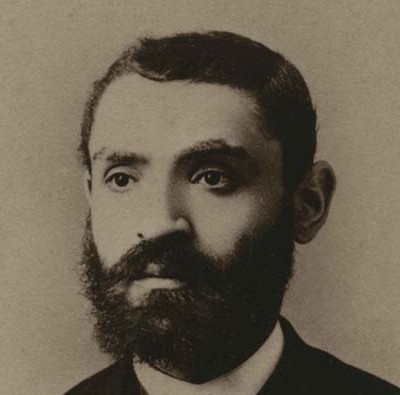
Raphael Dov Ber Wizansky (1856-1903) immigrated to Pittsburgh from Kalvarije, Lithuania, in 1871. He changed his name to Ralph B. Raphael when he became a citizen.
An autodidact, Raphael taught himself English, astronomy, violin and musical composition after arriving in Pittsburgh. He regularly published articles in Hebrew periodicals. He made a living by weaving human hair into brooches and watch fobs, as described in a profile by historian Ida Cohen Selavan. Raphael once wove an entire house and its furnishings out of hair, according to his daughter Jennie Lenchner. In the 1890s, Raphael bought a farm in Beaver County. He and his sons raised livestock and crops until ill health and a foreclosure forced him return to the city. He spent his final years operating a men’s clothing store in the Bloomfield neighborhood of Pittsburgh.
Raphael was an early Zionist leader in Pittsburgh. In 1893, he re-activated a local chapter of the dormant Havove Zion Society and published She’elat Hayehudim (The Jewish Question), which advocated for a return to the Jewish homeland four years before Theodor Herzl published The Jewish State. Raphael was also instrumental in bringing the American Zionist Convention to Pittsburgh in 1903 but died a month before the event.
Raphael married Rachel Sandusky, the daughter of the well known local midwife “Bubbe” Hannah Sandusky and her husband, Louis Sandusky. The couple had ten children, one of which died in infancy. The surviving children were Harry, Benjamin, Nathan, Israel, Lazarus, Sarah, Jennie, Rose and Libbie Rosenthal. Rose Raphael Jellinger co-founded the Young Ladies’ Sick and Relief Society, which purchased a horse-drawn ambulance for Montefiore Hospital. Lazarus Raphael was a local athletic star who died at 25. Nathan Raphael was an antiques dealer. Harry Raphael (1881-1914) founded the Raphael Electric Company at 143 Washington Street in the Hill District in 1903.
After Harry Raphael died, his brothers Benjamin Raphael and Israel “I. R.” Raphael took over the business. They relocated to 1405 Fifth Avenue and began selling light fixtures in addition to providing contracting services. “I started working there when I was 16,” I. R. Raphael said in an oral history for the National Council of Jewish Women, Pittsburgh Section. “I now own it myself… I wouldn’t even know how to do anything else. I wouldn’t know what to do.” The Raphael Electric Company wired many important buildings in Pittsburgh, including Montefiore Hospital, East Liberty Presbyterian Church and Horne’s Department Store after the building was damaged in the 1936 St. Patrick’s Day Flood. The company provided decorative outdoor lighting for Light’s Golden Jubilee, a 1929 citywide tribute to Thomas Edison and the incandescent bulb.
Between 1938 and 1941, the company changed its name to Brit Electric Company. During World War II, the American Bridge Company hired the company to wire 128 landing ship tanks being built in Pittsburgh. “My late brother Ben and I decided that this was the closest thing to actually doing something for the war effort,” Raphael later said. “I went down to the shipyard to talk to the commander. He asked me, ‘Raphael, have you ever wired any ships?’ I said, “No, there have never been any ocean-going vessels built in Pittsburgh, but I think we’ve done enough different kinds of wiring that we can adapt ourselves.’ We didn’t have fifteen hundred electricians. We had two or three fellows working in the office who played in the Pittsburgh Symphony and some carpenters and pipe-fitters. We ran a school and trained them. We had fifteen hundred men working for us, seven days a week.” The Navy issued a commendation to the company for its work.
I. R. Raphael was a charter member of Temple Sinai, which was founded in Squirrel Hill in 1946. His brother-in-law, Judge Benjamin Lencher, was the first president of the congregation. Raphael also sat on the board of the Jewish Home and Hospital for the Aged.